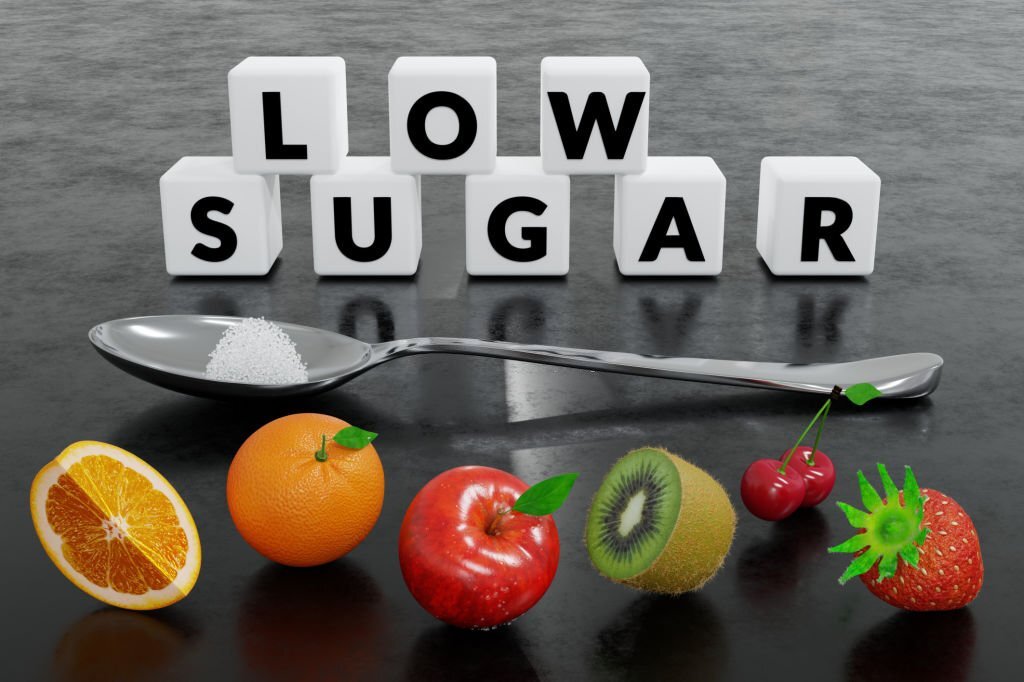Oh, the love-hate relationship we have with sugar! On one hand, it brings us scrumptious treats that make our taste buds dance with joy. On the other hand, taking too much sugar can cause several health issues.
What’s a fruit-loving individual to do? Fear not, for we have the answers!
In this mouthwatering article, we’ll delve into the world of the lowest sugar fruits and learn how to indulge in fruity goodness without going overboard on the sweet stuff.
Definition of Sugar and Its Effects on the Body
Sugar, that sneaky little delight, is a carbohydrate that occurs naturally in many foods, including fruits.
It can bring happiness to our taste buds but can also lead to health problems when consumed in excess.
It’s like a frenemy: you love it, but it can turn against you if you’re not careful.
Types of Sugar
There are many types of sugar, but we’ll focus on two: glucose and fructose.
Ah, glucose! That’s the powerhouse fueling our cells with energy, you see. And then there’s fructose, that oh-so-natural sugar found in fruits and honey, just waiting to sweeten our day.
Sugar can be both friend and foe to our body. In moderation, it provides energy and can even improve our mood.
But beware! Overindulging in sugar can sneakily tip the scale, fan the flames of inflammation, and up the ante for chronic nuisances like diabetes and heart disease. It’s a delicate dance, indeed!
Recommended Daily Intake of Sugar
The American Heart Association has cooked up some delectable wisdom just for you.
To ensure your heart remains in tip-top shape, they suggest that women relish a maximum of 6 teaspoons (25 grams) of sugar daily, while men can delight in a generous 9 teaspoons (38 grams).
Nutritional Benefits of Fruits
Fruits offer a cornucopia of nutrients that your body craves to stay healthy and happy!
From vitamins and minerals to fiber and antioxidants, these little powerhouses pack a big punch.
They can help support healthy digestion, improve immune function, and protect against chronic diseases.
The Lowest Sugar Fruits
Now, prepare your taste buds for a tantalizing journey with these low-sugar fruits, bursting with nutritious goodness while keeping the sweetness in check.
- Berries (strawberries, raspberries, and blackberries): Meet these luscious jewels, low in sugar yet overflowing with fiber, antioxidants, and vitamins. They’re the perfect scrumptious companions to yogurt, oatmeal, or salads.
- Avocado: Surprise! Avocado is a fruit, and it’s low in sugar. Plus, it’s packed with healthy fats and essential nutrients. Spread it on toast or mix it into a smoothie.
- Kiwi: This fuzzy little powerhouse is low in sugar but high in vitamin C, fiber, and potassium. Enjoy it on its own or in a fruit salad.
- Watermelon: Oh so sweet, yet surprisingly low in sugar and brimming with hydration—a true thirst-quenching delight!
- Cantaloupe: This melon is not only low in sugar but also a good source of vitamins A and C. Enjoy it on its own or in a refreshing fruit salad.
- Grapefruit: This citrus delight is low in sugar and high in vitamin C and fiber. Just be aware of potential interactions with certain medications.
- Peaches: These fuzzy wonders boast low sugar content while generously providing vitamins A and C.
Recommended Daily Intake of Fruits
The USDA has some juicy tidbits for you! They suggest that adults should relish in 1.5 to 2 cups of fruit per day, with the exact amount depending on your age, sex, and, of course, how much you love to move and groove.
Glycemic Index and Its Relevance to Fruit Selection
The glycemic index (GI) is your trusty sidekick, guiding you to foods that won’t send your blood sugar levels skyrocketing!
This nifty tool measures how quickly a food is digested and absorbed, which can impact your blood sugar levels.
Lower GI fruits, such as cherries and plums, may be better choices for those looking to minimize blood sugar spikes.
By choosing foods with a low GI, you can help regulate your blood sugar and maintain steady energy levels throughout the day.
Importance of Including Fruits in the Diet
Fruits are nature’s candies, providing essential nutrients, fiber, and antioxidants that support a healthy body.
It’s important to include them in our diet, but we need to be mindful of their sugar content.
Role of Fruits in a Healthy Diet
Picture this: a symphony of flavors and nutrients dancing harmoniously on your plate. A balanced diet should be a delightful medley of fruits, veggies, whole grains, lean proteins, and healthy fats, all joining forces for the greater good of your taste buds and well-being!
Fruits provide essential nutrients and should be consumed regularly, but in appropriate amounts to avoid excessive sugar intake.
Importance of Eating a Variety of Fruits
Variety is the spice of life, and the same holds true for fruits.
Consuming a diverse array of fruits ensures that you receive the full spectrum of nutrients they offer.
Balancing Fruit Intake with Other Food Groups
Maintaining a well-rounded diet requires you to balance your fruit intake with other essential food groups.
You might consider incorporating plenty of veggies, whole grains, lean proteins, and healthy fats to ensure that your body receives a diverse range of nutrients.
Remember, variety is the spice of life, and your body will thank you for it!
Conclusion
Incorporating low-sugar fruits into your diet allows you to reap the health benefits of these natural wonders without overloading on sugar.
Embrace the delightful diversity of these fruits and enjoy their burst of flavors and nutrients.
Remember, a balanced diet is key to maintaining optimal health, so don’t forget to include other food groups in your meals as well.
Now that you’ve discovered the world of low-sugar fruits and their marvelous benefits, it’s time to savor their flavors and let them dance on your taste buds. Cheers to a balanced diet full of natural delights!






